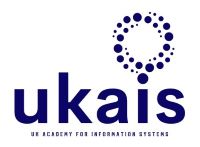TALK KEYWORD INDEX
This page contains an index consisting of author-provided keywords.
| A | |
| Abstract Data | |
| Academic Workload | |
| Accountability | |
| action learning | |
| affective experience | |
| affective norms | |
| affordances | |
| Agile Development | |
| AI | |
| AI Divide | |
| algorithm aversion | |
| Algorithmic Fairness | |
| Analytics | |
| Apparel | |
| Artificial Intelligence | |
| Artificial Intelligence Ethics | |
| Augmented Reality | |
| Autism Spectrum Disorder | |
| B | |
| barriers | |
| Bibliometric Analysis | |
| Blended learning | |
| Blockchain | |
| Blockchain Technology | |
| boundary objects | |
| Building Information Modelling | |
| Business Analytics | |
| business models | |
| C | |
| Capability | |
| carbon footprint | |
| Care | |
| Carers | |
| case method | |
| challenges | |
| ChatGPT | |
| ChatGPT4 | |
| Citizen Science | |
| Clinical Decision Making | |
| Clinical decision support systems | |
| Co-creation | |
| collaboration | |
| communication media | |
| conceptual modelling | |
| Confidentiality | |
| constraints | |
| Consumer Behaviour | |
| Context-aware | |
| Covid | |
| Critical Infrastructures | |
| cross-boundary collaboration | |
| crowdfunding | |
| Crowdsourcing Information | |
| Curriculum Design | |
| D | |
| Data Markets | |
| data-driven approach | |
| Data-driven sustainable cities | |
| Data-Sharing | |
| Dataset | |
| decision delegation | |
| decision theory | |
| Design Science | |
| design science research | |
| Design Thinking | |
| Developing Countries | |
| Differences-in-difference | |
| digital adoption | |
| digital artefacts | |
| Digital Divide | |
| Digital Economy | |
| digital ethics | |
| digital inclusion | |
| Digital Innovation | |
| Digital Intervention | |
| digital leaders | |
| digital platform | |
| digital poverty | |
| digital sustainability | |
| Digital Technologies | |
| Digital Transformation | |
| Digital Transformation Canvas | |
| Digital trust | |
| Digitalisation | |
| Digitalised Workplace | |
| Digitalization | |
| dilemmas | |
| disengagement | |
| disruption | |
| Dynamic Capabilities | |
| E | |
| E-justice system | |
| ecosystem-as-is | |
| ecosystem-as-was | |
| ecosystem-to-be | |
| Ecosystems | |
| Education | |
| emerging markets | |
| emerging technologies | |
| emotion | |
| Emotion regulation | |
| Emotional Support | |
| Emotions | |
| ethics | |
| ethics issues | |
| Evidence-Based Nudges | |
| Explainable AI | |
| Explainable Artificial Intelligence | |
| Exploratory Research | |
| extrinsic motivation | |
| F | |
| Factor Analysis of Information Risk | |
| FAIR-ROSI model | |
| Fashion Industry | |
| Feedback | |
| female IT professionals | |
| female IT students | |
| Fintech | |
| First impression | |
| Flow-oriented approach | |
| Foundation Models | |
| frameworks | |
| frontline employee | |
| G | |
| Gamification | |
| GenAI | |
| gender | |
| Generative AI | |
| Generative Artificial Intelligence | |
| Governance | |
| Grounded Approach | |
| H | |
| Health Information Systems | |
| Health sector | |
| Healthcare | |
| Hermeneutics | |
| Higher Education | |
| human-algorithm interactions | |
| Human-centered IA | |
| I | |
| ICT | |
| imagining | |
| Inclusion | |
| inclusive pedagogy | |
| India | |
| Inertia | |
| Information infrastructure sourcing | |
| Information Needs | |
| Information Sharing | |
| Instant Messaging | |
| Inter-organisational trust | |
| interpersonal relationship | |
| intersectionality | |
| intrinsic motivation | |
| Ireland | |
| IS education | |
| IT Professionals | |
| IT strategy | |
| IT-enabled organisational change | |
| K | |
| Key Informant | |
| knowledge work | |
| L | |
| Leadership | |
| Learning | |
| Learning Analytics | |
| Learning Barriers | |
| Learning loss | |
| Legitimacy | |
| live sales | |
| live-streaming commerce | |
| LLMs | |
| M | |
| Machine autonomy | |
| Machine Learning | |
| machine learning algorithm | |
| Matrix factorisation | |
| mediated communication | |
| Metaverse | |
| method | |
| Methodology in ISD | |
| micro-businesses | |
| Middle Manager | |
| Multi-Feedback | |
| multi-motive communication | |
| multithreading | |
| N | |
| NDCG | |
| Netnography | |
| network building | |
| network weaving | |
| NeuroIS | |
| NFTs Community | |
| Non-Fungible Tokens (NFTs) | |
| O | |
| Older | |
| Oncology | |
| Online Health Community | |
| Online Learning and Teaching | |
| Online learning challenges | |
| online learning processes | |
| online studies | |
| Online Technology | |
| Open Strategy | |
| Operationalized RAI | |
| Organisational Transformation | |
| Overtime | |
| P | |
| pandemic | |
| Perceptions | |
| platform value | |
| post purchase | |
| Practices | |
| Prediction Markets | |
| Principles | |
| Privacy | |
| privacy fatigue | |
| Process | |
| Product Return | |
| productivity | |
| productivity puzzle | |
| Project Materiality | |
| Project portfolio management | |
| Q | |
| qualitative | |
| Qualitative Case Study | |
| Quality of life | |
| R | |
| Radiotherapy | |
| reading | |
| Recommender systems | |
| Reflective Practice | |
| Remote work | |
| remote working | |
| Research Methods | |
| resilience | |
| resource orchestration theory | |
| Responsible AI | |
| Responsible Digital | |
| responsible innovation | |
| Retail | |
| Return on Security Investment | |
| Risk Assessment | |
| S | |
| Safe Secure and Wise Use | |
| Satisfaction | |
| Scoping Literature Review | |
| self-determination theory | |
| self-efficacy | |
| self-regulation | |
| semiotics | |
| Sensemaking | |
| Signalling Theory | |
| Smart contract | |
| Smart Maintenance | |
| Smartwatches | |
| Social Capital Theory | |
| Social Exchange Theory | |
| Social media | |
| social work | |
| Socio-Technical | |
| Sociotechnical Systems | |
| software carbon intensity | |
| software development | |
| Software entrepreneur | |
| speaking charisma | |
| Strategizing | |
| Strategy Execution | |
| Strategy practice | |
| streamers | |
| Structure | |
| student engagement | |
| student engagment | |
| student support stategy | |
| Success | |
| support | |
| Sustainability | |
| Sustainability Reporting Standards | |
| System of Systems | |
| Systematic Literature Review | |
| Systems thinking | |
| T | |
| tactics | |
| Teachers’ Perception | |
| teaching | |
| Teaching and Learning | |
| TEAeM | |
| techno-stress | |
| technological affordances | |
| Technology | |
| Technology adoption | |
| technology leadership | |
| technology-enabled personalization | |
| Technostress | |
| Temporal | |
| temporality | |
| Thematic Analysis | |
| Third Level Teaching and Learning | |
| Threshold Concepts | |
| time | |
| Traditional Organisation | |
| Transformation | |
| Transformative Learning | |
| Transparency | |
| Trust | |
| U | |
| UK | |
| uncertainty | |
| Unpaid | |
| User Engagement | |
| User experience | |
| V | |
| valence-arousal-dominance | |
| value capture | |
| value creation | |
| value delivery | |
| Virtual Reality | |
| virtual representation | |
| Visualisation | |
| Volunteered Geographic Information | |
| VOSviewer | |
| Vulnerability | |
| W | |
| WhatsApp Group | |
| wicked problem | |
| women | |
| women academics | |
| word embedding | |

